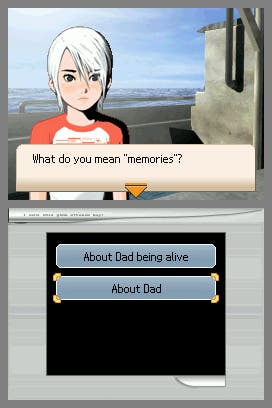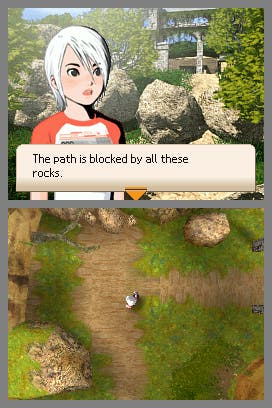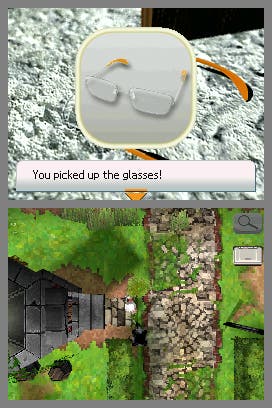Another Code: Two Memories
Another reason to get a DS?
Ever since the DS came out it was fairly obvious the touch screen console leant itself perfectly to genres that - up to now - had worked best with the mouse and keyboard input system. In particular, wouldn't the DS present an absolutely perfect opportunity for a publisher to reawaken that sleepiest of genres, the point-and-click adventure?
While all of us older gamers dream of LucasArts getting back to what it did best (fat chance), it seemed inevitable that someone with a bulging, classic-ridden back catalogue (hint: LucasArts, get your act together) would at least port some of it to make free money and entertain a whole new audience into the bargain. But this vision of puzzle-driven, narrative rich immersion finding a new home has come along far sooner than we had imagined - and from an unlikely source.
CING when you're winning
Nintendo itself has plucked the work of little-known developer CING out of thin air and conjured an all-new title to wrap our lateral thoughts around; an exciting prospect that we flapped into like a blundering moth into a Bunsen Burner. But before we get into the melting of our frazzled brain and associated issues, let's deal with what Another Code is all about.
Just before her 14th birthday, Ashley receives a 'mysterious' package from her father - a father she thought had died when she was three. The letter instructs Ashley to come to a deserted island where he says he will be waiting for her. Completely freaked out, she goes along with her aunt and sails to the island, which is where you come in.
With your Auntie Jessica going off ahead (for no good reason, thinking about it), you're forced to eventually try and find her, but at this point all that's available to you are a few locations with a locked gate, a few crumbling gravestones and a deserted old mine. Time for those dried up, shrivelled adventuring glands to come back to life and begin the painstaking process of poking around for clues, talking to anyone who'll give you the time of day and picking up anything not nailed to the floor...
D's dead

For the bulk of the game, the only person who'll engage with you at all is, in fact, dead. Known only by the name 'D', this young whippersnapper ghost has been in some sort of confused limbo for 57 years, and Ashley is the first person who he's been able to interact with in all that time. Suffice to say, with such a long period of prolonged boredom he's forgotten almost everything about his life - that is, until Ashley's investigations begin to awaken both of their memories of their troubled past.
And without wishing to spoil it any further, the game becomes an ongoing quest to work your way inside the deserted Blood Edward mansion (the clue is in the name, it seems) to find out what really went on back in 1948. Probably the most important facet of any adventure is the story itself, and on that basis Another Code is pretty engaging, pulling the whole forgotten past premise off rather well.
Not only is the idea fairly original in a gaming context, but the drip-feed of information keeps you hooked for hours on end, poking around, ever-hopeful for uncovering the next section and some more insight into the terrible events that had remained hidden for so long. And what of Jessica? Where on Earth is she? What is the Another project all about? How did D die and who killed him? All of these questions remain unanswered for an eternity, and Another Code does a great job of structuring the game well to keep you guessing.
Touch of class

The interface, too, is brilliantly implemented, giving over the lower screen to an overhead view of the room, complete with Ashley's relative position. To move to a new part of the room, simply touch where you want to head and the top-screen view changes to illustrate a static character's-eye-view of the scene in true old-school adventure style that evokes fond memories of the text/graphical approach of the mid-'80s.
If you happen to see anything worthy of further inspection a magnifying glass icon lights up in the lower right of the touch-screen, allowing you to tap that to give a zoomed-in view of the article in question. From there, the touch-screen view matches that of the top portion, giving direct touch-based access to, for example, a chest of drawers or a desk. Anything on top of the desk can then be directly clicked on and accessed, with important items being picked up automatically. Meanwhile, conversation systems are simplified into subject matters, playing out with no degree of choice but serving as more of a narrative break then an investigative tool as they might generally have appeared in the past.
Later, puzzle specific sections often involve tactile involvement, to - for example - turn a key, rearrange a bookcase or play the piano. It's a delightfully simple and intuitive system that's also flexible and innovative, often involving overlaying photographs, spinning objects around and the like.
Stuck faster than Superglue

Where we have issues with Another Code is the same problems we always used to encounter with adventure games: getting stuck. When you're stuck in the game, it becomes one hell of a chore to keep revisiting the same rooms, clicking on the same objects in the vain hope you missed something last time.
Slightly irritatingly, some objects you want to pick up can't actually be picked up until some other event has happened elsewhere, often meaning a lot of unnecessary repetition as you go through every single location twice, three times, more, on the hunt for the one widget that'll solve the one puzzle that's holding up the entire game. Some sort of hint-based system would have gone a long way in Another Code, and lifted free a huge amount of frustration. That's essentially the problem with a lot of these games; when you're stuck it's possibly the least fun you can have in a videogame. It's fair to say you'll get stuck a lot in Another Code, and that's the rub.
If you know what you're dealing with, then Another Code can be a hugely immersive experience that's totally unique among handheld games. Sure, adventure games have appeared on handhelds before, but none have been so perfectly tailored to the strengths of the system. If you need you thirst for adventuring quenched, Another Code is an essential purchase, but novices need to bear in mind that this style of game is very much an acquired taste, and experts should be mindful that compared to the adventuring greats it's not exactly in the same league. That said, it's a very welcome release and stands alone, making it a great curiosity purchase if nothing else. Now pass me the solution before I go completely nuts...

